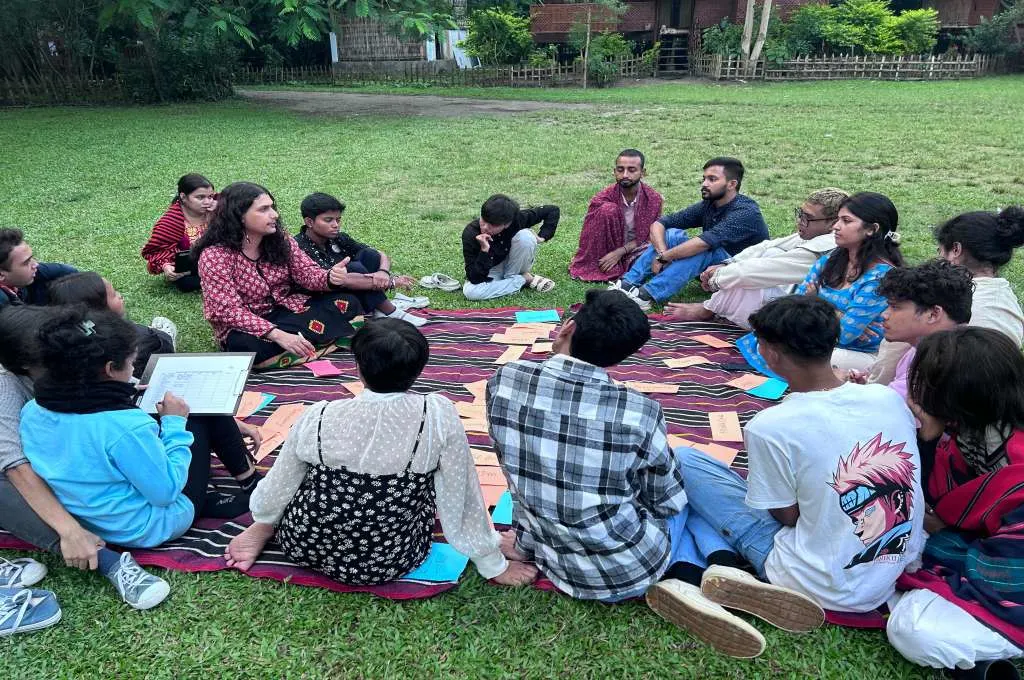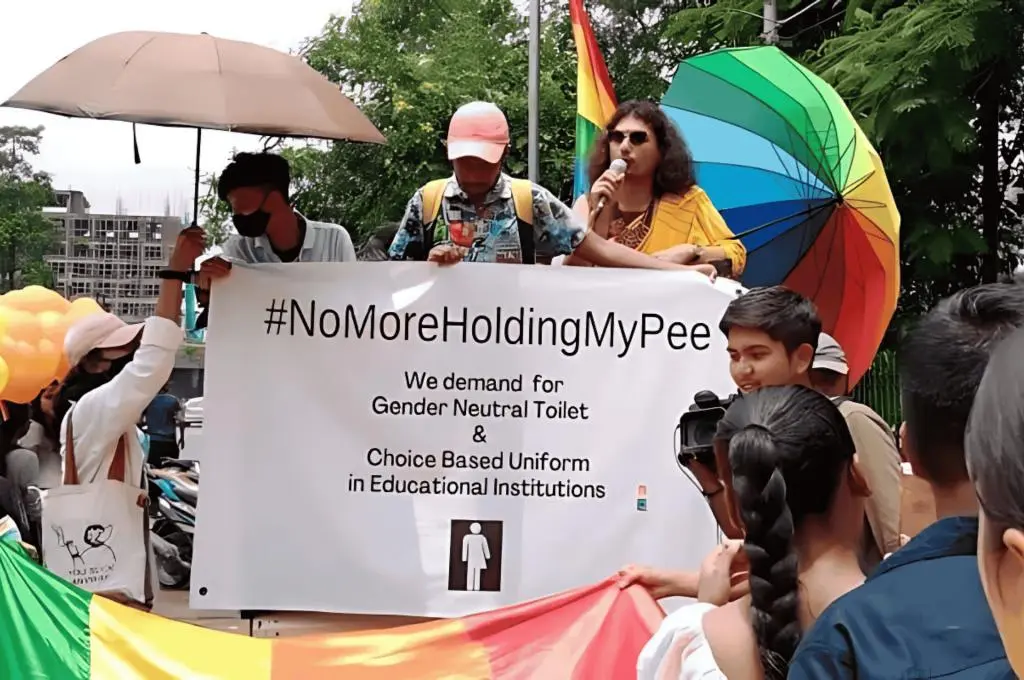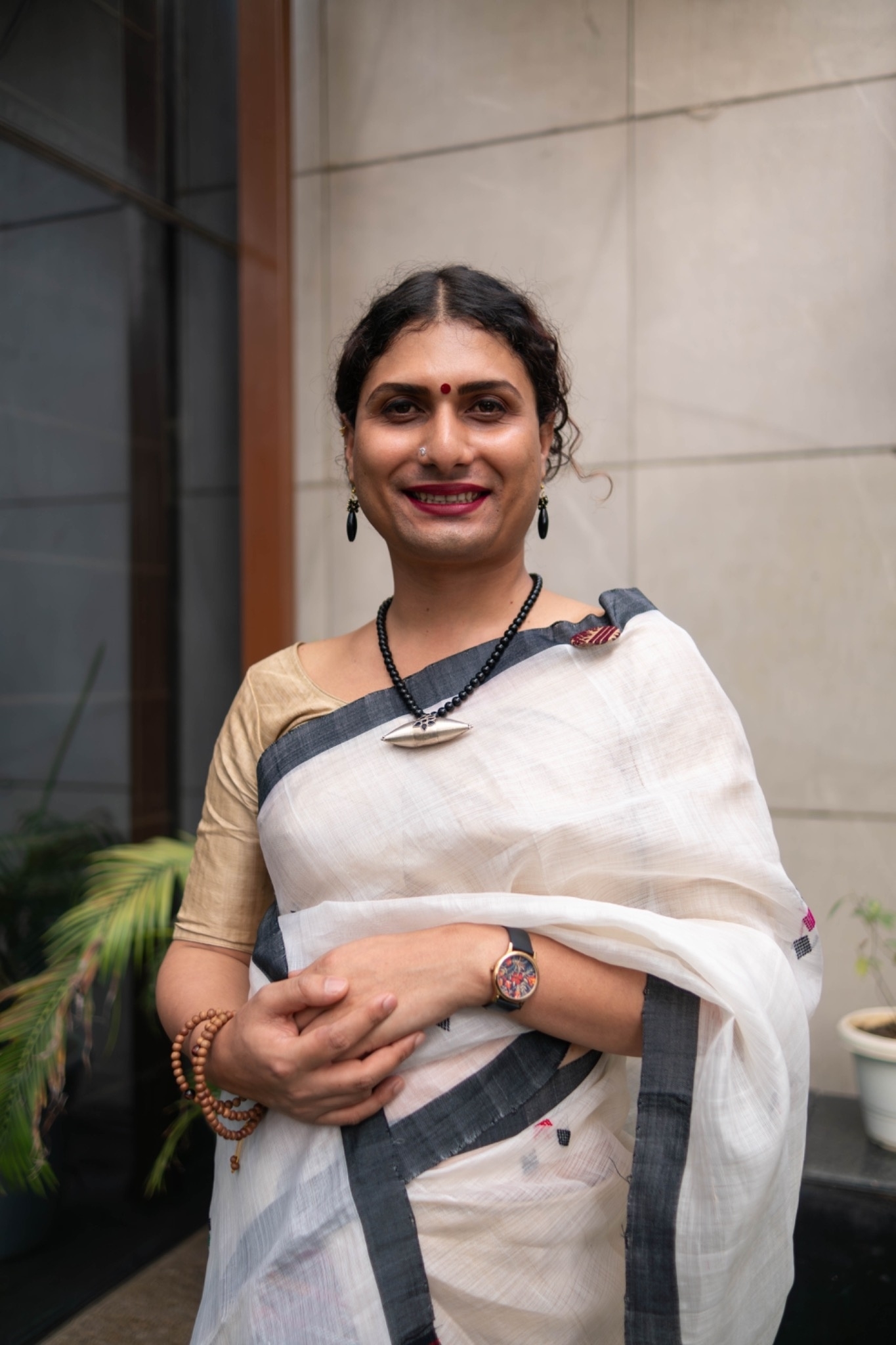While conversations around diversity and inclusion have gained visibility in recent years, queer and trans individuals—particularly those from Dalit, Bahujan, Adivasi, working class, and other marginalised backgrounds—continue to face systemic exclusion across policy, civil society, academia, the development sector, and government institutions. The burden of constantly educating cisgender society and the glaring absence of institutional mechanisms for genuine inclusion remain everyday realities.
In response to these persistent inequalities, especially the lack of inclusive and safe spaces, I founded two community libraries under Akam Foundation—Kitape Katha Koi in my village in Jorhat, Assam, and the Chandraprabha Saikiani Feminist Library and Resource Centre in Dibrugarh, Assam. These are more than just rooms with books; I think of them as political spaces. These spaces have been built for young queer people, especially from rural and small-town India, to access knowledge safely and without judgement.
To include queer and trans people in mainstream education, livelihoods, and decision-making, dominant systems must begin by acknowledging a fundamental truth: We are equal citizens, entitled to equal rights, and deserving of the same dignity as anyone else. True inclusion requires sustained, institutional change—one that centres trans and queer leadership, ensures equitable access to resources, and affirms our identities.
I have learned from experience that this change must happen on many fronts— through grassroots community mobilisation, sensitisation of government and academic institutions, and introspection within the social sector itself. Only then can we begin to reimagine current systems and rebuild them to truly include us, and provide opportunities for dignified livelihoods.
Inclusivity starts with meeting communities where they are
Organising queer communities, especially in small-town and rural areas, isn’t easy. There is a dearth of information about LGBTQIA+ movements and spaces, an absence of language and terminology, and often, a lack of hope and pathways to move forward. So, one has to meet people where they are. In our case, we hold informal meetings at tea stalls and on rooftops; host pride events in small towns; and build community slowly and carefully, based on a foundation of trust.
Sustainable change requires thinking about inclusivity as more than an issue-based struggle—it is about claiming spaces and making them available for us. For example, I weave my queer politics into every aspect of my library work. From the books we stock to the events we host—pride-themed readings, feminist storytelling sessions, workshops on identity—the focus is on building an inclusive model. When people hear their experiences echoed in someone else’s story, it creates connection. Using this as a starting point, we talk about rights, leadership, feminist politics, and collective care.
This is how one of our campaigns, No More Holding My Pee, took shape. It began after a trans student shared how unsafe they felt using binary-gendered toilets, and how most institutions don’t have gender-neutral toilets. What started as a conversation turned into a movement, and soon we had support from student groups, faculty, and activists. We successfully lobbied for gender-neutral toilets in several institutions. The process opened doors to deeper conversations about safety, access, and belonging.

The cost of performative inclusion
Sometimes inclusion takes a dangerously performative turn, revealing deeply ingrained biases. Here’s a glaring example: Someone once remarked that they needed a ‘proper Northeastern-looking person’ for a panel, instead of me, even though I am from the Northeast. This aesthetic-based idea of representation shows just how shallow efforts can be when inclusion isn’t rooted in respect, equity, and structural change. Tokenism reduces people to symbols that are used when convenient, rather than treating them as integral participants in shaping institutions. Many organisations fall into this trap, placing women on panels solely for gender-related issues or calling on trans voices only when the topic is connected to trans rights.
Institutions, nonprofits, and collectives must ask themselves difficult, reflective questions. Are individuals from marginalised communities genuinely involved in your hiring processes, leadership structures, and decision-making? Or are they simply present for visual diversity or to fulfil a quota?
Representation must focus on redistributing power.
Equally important is what comes after hiring—it is essential to consider if the systems in place allow people from marginalised backgrounds to survive, thrive, and grow within the organisation. This requires rethinking of HR policies, workplace culture, and support systems to ensure safety, dignity, and belonging. Some questions to think about are: Do your group health plans include gender-affirmative care, or are key benefits inaccessible to trans employees? How does your organisation define ‘women’ in their policies, whether it’s for POSH compliance, menstruation-related leave, or safety audits. Do these policies include gender-diverse people, or do they simply reinforce the cishet binary?
Staff across all levels need regular, meaningful training to challenge unconscious biases and build a culture of respect and empathy. Without this, even the best policies remain superficial.
Representation must focus on redistributing power. Inclusion should mean that marginalised voices are not just heard but are also actively shaping policies, leading teams, and holding space at every table.
Reimagining livelihoods with and for trans communities
In one of our meetings, a young trans person asked me, “Is there a future for us beyond begging and sex work?” My heart broke, not because of the question, but because of the painful truth it carried.
There are barely any successful livelihood models for trans persons in India. This forces many from my community to continue engaging in traditional occupations such as begging or sex work—not because of preference but because mainstream society doesn’t allow for alternatives. Reforming livelihoods must not be about erasing, shaming, or criminalising these professions, but about ensuring real choices and opening doors to opportunities.
Unless the organisation is specifically focused on gender and sexuality, the inclusion of trans and queer people is often overlooked in hiring practices—especially in leadership or decision-making roles.
For instance, if an organisation works on labour rights, agriculture, or education, they may not see the relevance of hiring someone outside the gender binary. It simply doesn’t strike them as important. But trans and queer people exist in every sector and are impacted by every policy—whether or not it’s explicitly about gender or sexuality.
In cities like Mumbai, Delhi, and Bangalore, some community-led organisations are working on providing alternate livelihoods, such as by collaborating with corporates to create skill-building and placement opportunities for trans persons. These efforts often include polishing CVs, soft skills training, and corporate exposure. This model has resulted in short-term success—many individuals have found jobs and seen immediate benefits. However, we do not have sufficient data beyond a couple of years to understand if trans persons are able to sustain those jobs or what kind of challenges they face in those spaces.
In the southern part of India, a growing number of trans persons are engaging in small-scale income-generating activities, such as running tea stalls, Xerox shops, or clothing corners. These are often independently initiated or supported by local CSOs, and reflect a shift towards entrepreneurial self-reliance.
Some organisations, like mine, are also initiating livelihood models by collecting community contributions and liaising with local government. For instance, we recently helped a trans woman set up a sewing business. Our strategy now is to model such interventions at the district level, build evidence and alliances, and eventually advocate at the state level for a dedicated trans livelihood policy.

Recognition is incomplete without rights
The topic of livelihoods cannot be discussed without addressing the obvious discrimination we face from government institutions. We have trans ID cards and shelters, but these are useless when there’s no livelihood, no dignity, and no ownership of resources.
During a recent meeting with around 15 community members and representatives from various government departments and programmes—such as the Livelihood Mission, Health Mission, and Social Justice—many trans and queer participants shared their experiences of discrimination. One of the most recurring and painful issues raised was the behaviour of government officials when community members seek support or services. A hurtful comment shared by a participant captures this deep-seated bias: “Inn logo ko kaam dene ka kya fayda, yeh log toh nachenge.” (What’s the point of giving them work? They’ll just end up dancing.)
Such statements reflect the entrenched transphobia, casteist mindset, and stereotyping that make it nearly impossible for community members to access their rights with dignity. Addressing this requires not just policy-level changes but also a fundamental shift in attitudes, staff training, and institutional culture.
We need skill-building programmes rooted in community realities.
Some government-supported models for livelihoods do offer a roadmap. For example, the Odisha government provides a notable model, where trans persons have been included in self-help groups (SHGs) and integrated into the municipal waste management systems. These SHGs operate professionally, earn a regular income, and are a promising instance of state-led inclusion. The incorporation of trans persons into formal, salaried roles in waste management is especially significant in terms of visibility and stability. However, even within this model, it’s important to apply a critical lens—especially around working conditions, pay parity, and decision-making power.
A key structural challenge is that when we approach the government for livelihood schemes or policy inclusion, they demand data—particularly numbers. Since the trans population is relatively small and many community members are undocumented, we are often excluded from schemes. There is a constant struggle around ID proofs, documentation, and visibility in official records.
Ultimately, we need skill-building programmes rooted in community realities and state support that is not conditional or extractive. Additionally, we need reservation in education, meaningful employment quotas, and infrastructural inclusion.
Funders should move beyond conditional support
One of the most pressing issues faced by trans communities is that financial institutions do not trust us. Very few banks or lenders are willing to offer loans or credit to trans individuals. Without access to formal credit, starting or expanding a business becomes nearly impossible.
Therefore, funders must recognise the multiple, intersecting barriers faced by trans-led organisations. We operate within various margins—facing both financial and emotional strain, while constantly being expected to prove our legitimacy to those who often do not understand our lives, our work, or our challenges.
A critical lesson for funding agencies is to reflect on how they structure their support. Most funding remains tied to rigid proposals, outcome-based models, and predefined sectoral priorities that do not fit the organic, evolving realities of grassroots organisations led by trans, queer, Dalit, and disabled communities, among others.
Moreover, even within the current funding ecosystem, it must be asked: Who is actually receiving the funds? All too often, it’s the big nonprofits that already have networks and resources, while smaller, community-rooted groups are overlooked or left to struggle with minimal support. The closure of the Mitr Clinic in Hyderabad is a stark example—when USAID withdrew its support, a crucial space for trans healthcare was lost. Who steps in then? Why is trans healthcare not treated as a priority?
The funding world must move beyond transactional models. What we truly need is flexible, multi-year grants; trust-based funding that invests in people, not just outputs; support for rest, reflection, and rebuilding, rather than merely focusing on reporting; and a real commitment to equity, not just representation in documents.
—





